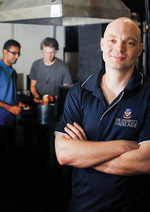Saving lives with smart engineering
Engineering students at the University of Adelaide are applying their expertise and creativity to produce real-life humanitarian solutions to help communities in developing countries. Millions of people die every year because they lack access to essential services and resources which many Australian communities take for granted. Schools within the University of Adelaide's Faculty of Engineering, Computer and Mathematical Sciences have linked with not-for-profit humanitarian organisation Engineers Without Borders (EWB) on various projects designed to improve access to basic human needs such as clean water, sanitation and hygiene. The University is now planning to extend opportunities for students by establishing a humanitarian engineering elective course next year which will be available across disciplines, including architecture and agriculture. Meanwhile, final-year civil engineering students Robbie Goedecke and Nicholas Grear are also working on increasing humanitarian support by establishing an EWB student chapter at the University. "Not only is it a great cause and an opportunity to use your skills to do something worthwhile to benefit others, but it can also lead to job opportunities," said Mr Goedecke. "Engineering graduates who become involved in community development projects find they have an improved chance of gaining employment, particularly in similar areas overseas." The number of humanitarian projects at the University is on the increase. Last year five first-year chemical engineering students were selected as the South Australian finalist team in the EWB Challenge, a national competition for sustainable cross-cultural development initiatives. The challenge was held in partnership with Habitat for Humanity Vietnam with teams working on projects for the Anh Minh district on the Mekong Delta. The University of Adelaide team designed a cheap but effective biodigester which can be used to turn vegetable matter into biogas for fuel in kitchens. Their design involved using a flexible polyethylene bag which was low cost and low maintenance. Since 2011, under the supervision of Dr Paul Medwell and Dr Cristian Birzer, mechanical engineering students have been applying their skills to design a safe and efficient dung burning stove suitable for Nepalese conditions and adaptable for other parts of the world. An estimated three billion people - nearly half the world's population - use poor performing stoves indoors for cooking and to keep warm. As a result, about 1.6 million die every year because of the noxious fumes they breathe. For children under five it is the biggest cause of death. Because families in the Nepalese Terai region burn dung, this has been the material of choice for the Adelaide students who have found a plentiful supply at Monarto Zoo. Dr Birzer, a lecturer in the School of Mechanical Engineering, said the students have worked with all types of dung from giraffes, zebras and many other animals to test for noxious substances and their calorific value for efficient burning. "It's a bit revolting because to prepare the dung you have to wash out the nutrients and shape it into little cakes," said Dr Birzer. "These are students who have been involved in rocket science and robotics and all those other high tech areas. But they love being involved in this project - I was surprised how excited they actually are. They had a mass production system going." The new team for this year is commissioning a furnace to accurately assess combustion for various fuels in order to improve their stove design. Their idea involves top-lit, up-draft (TLUD) technology which provides more complete combustion with less emissions than conventional bottom-lit stoves. Importantly, the stoves can be made by householders from cheap, commonly available materials such as used product cans. "The most difficult thing is punching the holes in the can and that can be done with a hammer and hole punch," said Dr Birzer. The design was placed online and has attracted interest from around the world. Links have been established with the IBEKA Foundation in Indonesia, the International Young Professionals Foundation which does community work in Africa and the San Diego Zoo which is interested in work for Vietnam. While deaths from stove smoke are high, nearly twice as many people die in developing countries from drinking contaminated water - an estimated three million every year. This is another challenge being tackled by the mechanical engineering students. In a project just started, they are investigating designs for portable and cheap water treatment systems using either solar thermal power or solar UV power to treat the bacteria. The preparatory work includes determining which part of the world they want to help, whether it's river or rain water and the types of hazards.
|




